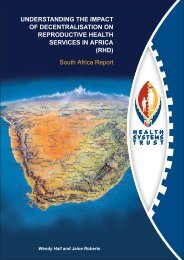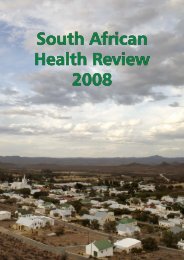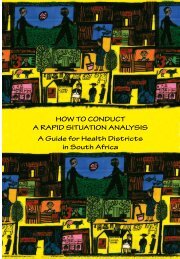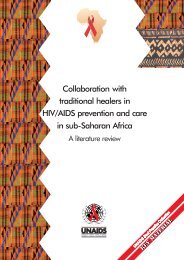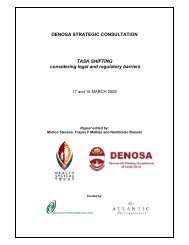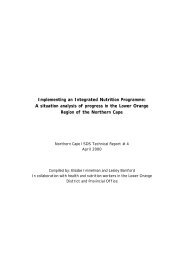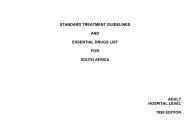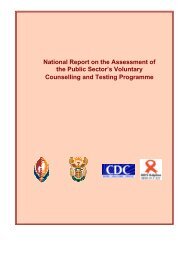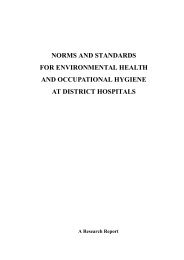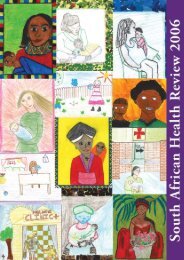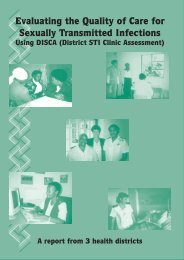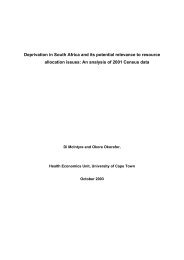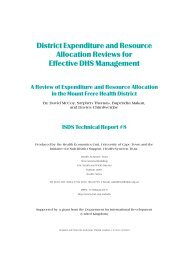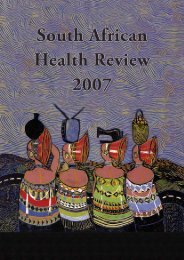COMMUNITY BASED SITUATIONAL ANALYSIS Maternal and ...
COMMUNITY BASED SITUATIONAL ANALYSIS Maternal and ...
COMMUNITY BASED SITUATIONAL ANALYSIS Maternal and ...
You also want an ePaper? Increase the reach of your titles
YUMPU automatically turns print PDFs into web optimized ePapers that Google loves.
5. DISCUSSION: TRIANGULATION AND SUMMARY OF RESULTS<br />
In triangulating the results across the various sources of data in this study, many consistent<br />
themes emerged. This section provides a short summary of the primary themes that were seen<br />
in this analysis:<br />
• Transport <strong>and</strong> Distance to Care are the biggest problem faced by women <strong>and</strong> families<br />
in accessing health services.<br />
• Communication by health workers with families was shown to be inadequate leading to<br />
a decreased confidence in the health services.<br />
• Health Seeking Behaviour is good, <strong>and</strong> despite often poor treatment <strong>and</strong> lack of<br />
communication by the health services, the study showed that most people first seek<br />
help from the clinic or hospital <strong>and</strong> only when failed by the Western medical system did<br />
they access traditional medicine. Women <strong>and</strong> families appear to only delay or not<br />
access services when they cannot get there (see transport above) not because they do<br />
not want to access services, or do not feel the services are valuable.<br />
• Treatment by health providers <strong>and</strong> quality of care as reported by the mothers <strong>and</strong><br />
families was mixed, as examples of both good <strong>and</strong> poor treatment <strong>and</strong> care were cited<br />
by respondents.<br />
• HIV/AIDS is a major issue but we cannot overlook basic maternity <strong>and</strong> neonatal service<br />
quality.<br />
• Families <strong>and</strong> Communities are untapped resources that play a crucial role in<br />
determining health seeking behaviour <strong>and</strong> utilisation of services.<br />
6. RECOMMENDATIONS<br />
1. 24-hour emergency transport services must be available within each community for<br />
emergency obstetric <strong>and</strong> paediatric care.<br />
2. Community education about maternal <strong>and</strong> infant health <strong>and</strong> danger signs is imperative.<br />
3. Hospital protocols for assessment <strong>and</strong> treatment of women <strong>and</strong> infants must be<br />
reviewed <strong>and</strong> current st<strong>and</strong>ards must be implemented.<br />
4. All facilities must be adequately supplied with the essential medicines <strong>and</strong> supplies to<br />
promote maternal <strong>and</strong> infant health.<br />
5. Sensitivity training for hospital staff working with mothers <strong>and</strong> infants should be<br />
explored <strong>and</strong> communication with families needs to be enhanced.<br />
6. Given that Nevirapine is successful in reducing the transmission of HIV to newborns, it<br />
is essential that the PMTCT programme functions well <strong>and</strong> is monitored effectively.<br />
7. HIV <strong>and</strong> AIDS services need to be exp<strong>and</strong>ed, integrated <strong>and</strong> comprehensive.<br />
8. Cooperation <strong>and</strong> communication with families <strong>and</strong> communities needs to be enhanced.<br />
Community Based Situation Analysis: <strong>Maternal</strong> & Neonatal Follow-up Care<br />
xiv



